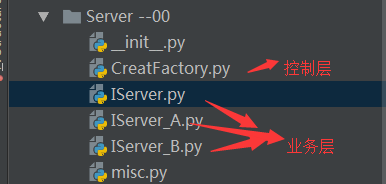python 全局变量的import机制介绍
先把有问题的代码晒一下:

IServer.py
from abc import ABCMeta, abstractmethod
print __name__
class IServer:
def __init__(self):
pass
@abstractmethod
def DoWithA(self):
pass
@abstractmethod
def DoWithB(self):
pass
IServer_A.py
import IServer
serverType ='1001'
print __name__
dir()
from CreatFactory import GLOBAL_class_dic
dir()
class IServer_A(IServer.IServer):
def __init__(self):
pass
def DoWithA(self):
print 'Server_A do with interface A'
def DoWithB(self):
print 'Server_A do with interface B'
global GLOBAL_class_dic
print 'the id of GLOBAL_class_dic in A is:',id(GLOBAL_class_dic)
GLOBAL_class_dic[serverType] = IServer_A
print 'GLOBAL_class_dic in a is:', GLOBAL_class_dic
IServer_B.py
import IServer
serverType ='1002'from CreatFactory import GLOBAL_class_dic
print __name__
class IServer_B(IServer.IServer):
def __init__(self):
pass
def DoWithA(self):
print 'Server_B do with interface A'
def DoWithB(self):
print 'Server_B do with interface B'
print 'the id of GLOBAL_class_dic in B is:',id(GLOBAL_class_dic)
GLOBAL_class_dic[serverType] = IServer_B
print 'GLOBAL_class_dic in b is:', GLOBAL_class_dic
CreatFactory.py
#coding:UTF-8
import os;
import sys;
import threading
from misc import *
global GLOBAL_class_dic
GLOBAL_class_dic ={1:1}
print 'GLOBAL_class_dic in define is:', GLOBAL_class_dic
print 'the id of GLOBAL_class_dic in define is:', id(GLOBAL_class_dic)
dir()
import IServer_A
import IServer_B
def CreateServer(serverType):
global GLOBAL_class_dic
print 'GLOBAL_class_dic in use is:', GLOBAL_class_dic
print 'the id of GLOBAL_class_dic in USE is:', id(GLOBAL_class_dic)
if GLOBAL_class_dic.has_key(serverType):
return GLOBAL_class_dic[serverType]
else:
return 'no'
if __name__ == '__main__':
pass
# 接收到报文后,根据报文的内容,从db中获取到serverType,假设获取到的serverType=1001
print 'main'
print 'GLOBAL_class_dic in main A is:', GLOBAL_class_dic
serverType = '1002'
server = CreateServer(serverType)
print 'GLOBAL_class_dic in main B is:', GLOBAL_class_dic
print 'server :',server
server.DoWithA(server())
代码内已经加了调试的部分信息, 运行CreatFactory.py。调用DoWithA失败,提示AttributeError: 'str' object has no attribute 'DoWithA'。运行结果如下:
D:\Python27\python.exe "D:/DesignMode/Server --00/CreatFactory.py"
GLOBAL_class_dic in define is: {1: 1}
the id of GLOBAL_class_dic in define is: 36230176
['GLOBAL_class_dic', 'Misc', '__builtins__', '__doc__', '__file__', '__name__', '__package__', 'binascii', 'inspect', 'minidom', 'os', 'struct', 'sys', 'threading']
IServer
IServer_A
['IServer', '__builtins__', '__doc__', '__file__', '__name__', '__package__', 'serverType']
GLOBAL_class_dic in define is: {1: 1}
the id of GLOBAL_class_dic in define is: 36230032
['GLOBAL_class_dic', 'Misc', '__builtins__', '__doc__', '__file__', '__name__', '__package__', 'binascii', 'inspect', 'minidom', 'os', 'struct', 'sys', 'threading']
['IServer', '__builtins__', '__doc__', '__file__', '__name__', '__package__', 'serverType']
['GLOBAL_class_dic', 'IServer', '__builtins__', '__doc__', '__file__', '__name__', '__package__', 'serverType']
IServer_B
the id of GLOBAL_class_dic in B is: 36230032
GLOBAL_class_dic in b is: {1: 1, '1002': <class IServer_B.IServer_B at 0x022C2ED8>}
['GLOBAL_class_dic', 'IServer', '__builtins__', '__doc__', '__file__', '__name__', '__package__', 'serverType']
the id of GLOBAL_class_dic in A is: 36230032
GLOBAL_class_dic in a is: {1: 1, '1002': <class IServer_B.IServer_B at 0x022C2ED8>, '1001': <class IServer_A.IServer_A at 0x02273420>}
main
GLOBAL_class_dic in main A is: {1: 1}
GLOBAL_class_dic in use is: {1: 1}
the id of GLOBAL_class_dic in USE is: 36230176
GLOBAL_class_dic in main B is: {1: 1}
server : no
Traceback (most recent call last):
File "D:/DesignMode/Server --00/CreatFactory.py", line 38, in <module>
server.DoWithA(server())
AttributeError: 'str' object has no attribute 'DoWithA'
Process finished with exit code 1
从运行的结果,可以看到:GLOBAL_class_dic 被定义了2次。有两个不同的id,第一次定义分配了一块内存,第二次不明原因的又重新分配了一块内存,然后服务的自动注册全部注册在这块内存中,等到main函数使用的使用,又使用的是第一次申请的内存,所以导致程序运行失败。那问题就来了,为什么会被重新又分配了一次?
之所以会被重新定义一次全局变量,是因为在执行CreatFactory.py时,最开始定义了全局变量,此时该命名空间可使用的函数和变量打印:['GLOBAL_class_dic', 'Misc', '__builtins__', '__doc__', '__file__', '__name__', '__package__', 'binascii', 'inspect', 'minidom', 'os', 'struct', 'sys', 'threading',然后在import IServer_A,在IServer_A.py中,import IServer后,在from CreatFactory import GLOBAL_class_dic打印出可使用的函数和变量时,['IServer', '__builtins__', '__doc__', '__file__', '__name__', '__package__', 'serverType'],就没有GLOBAL_class_dic,程序发现没有,就又重新声明了一遍。似乎问题原因已经找到了。
python在导入的时候,有2种场景,一种就是在文件前普通的import语句,还有一种就是特殊的场景:__main__模块是相对于Python的导入系统。在最开始运行CreatFactory.py文件时,__name__打印的值是__main__,而再子类再次导入时,会在当前命名空间查找是否已经导入__name__=CreatFactory,发现这个模块不存在,故此又导入了一遍,全局变量由此又被重新定义分配了内存,后期全局变量在子类业务的使用就都使用该值,而在main函数里,使用的又是当前的作用域内的第一次定义的全局变量。

